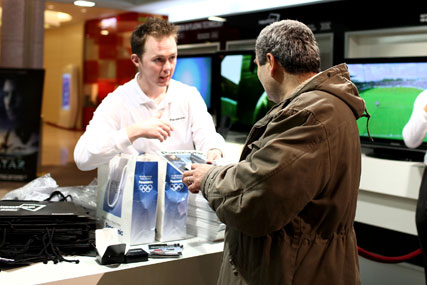Successful experiential campaigns tend to have a few key ingredients such as a clever idea, a neat execution, and the ideal location to reach the target audience.
However, a branded experience is likely to fail without the most important element of all - people. A team of motivated, well-briefed brand ambassadors will engage and excite consumers. Uncaring and unreliable staff, however, will project a negative image of the brand and be unconcerned if the campaign falls flat.
Some brands solve this problem by using in-house staff, who have a direct stake in a campaign's success, but this is not always viable. The scale of a brief can mean temporary staff must be drafted in.
Rigorous selection
For Sony Ericsson, getting consumers to handle and try out its latest handsets is crucial. Its brand ambassadors not only take part in live demonstrations, but also train shop staff on how to showcase the technology.
'It's not just a case of someone turning up, letting the customer take a picture and then walk away,' says Richard Dorman, senior marketing manager at the handset maker. 'Whatever activity we take part in, and ask consumers to take part in, it has to be engaging for the staff, too.'
Promotional staffing agencies have methods for ensuring their people perform at their best when they turn up to work.
PeoplePeople, part of the same group as experiential agency RPM, has up to 4000 names on its books, for jobs ranging from handing out samples to acting and dancing.Jane Richardson, its head of staffing, admits that brand ambassadors lead a transient working life, representing a multitude of brands, but points out that the selection process for each campaign is rigorous.
'We don't just chat to them about the campaign and let them go,' she says. 'We ask them what attributes they have that match the requirements of the campaign.'
The company incentivises staff by operating a star rating system; those with higher ratings receive more work.
The staffing division of experiential agency Closer has 3500 people on its books. It uses a mystery-shopper approach to reward staff on the spot for delivering their brief.
'Brand ambassadors are at the forefront of any experiential activity,' explains Lucy Uden, Closer's client service director. 'They are engaging first hand with consumers, so ensuring they are trained, right for the brand and proactive, sets you ahead from the outset.'
Experts say that while the right personality and experience are crucial, a knowledge of how the marketing process works makes an individual even more accomplished.
Staff that can highlight relevant retail promotions to consumers will enhance the prospect of an experience being converted into a sale. The best ones also know the value of feeding back reactions and comments that could inform future marketing strategy.
'When we recruit brand ambassadors, we look for individuals who understand marketing, know how to pull an audience and can really engage consumers through the force of their personalities,' says Polly Barnes, director of promotional staffing specialist at The Staff Republic. 'We also use psychometric testing at open assessment days to identify fresh individuals with the right attributes to thrive in this work, rather than simply relying on those with past promotional experience.'
In an ideal world, marketers would recruit and train their own, in-house experiential teams, but in reality, they must work closely with staffing specialists to ensure appropriate levels of training and incentives are in place for temporary staff. Choose the wrong people, and the image broadcast to the public will be one of indifference and laziness.
Get it right, and not only will consumers engage with your product but your brand ambassadors will be prepared to go that extra mile, creating not only a memorable experience, but also a long-term positive affinity.
FIREFLY: sales uplift is just the tonic
Firefly Tonics boosted its sales at Barclays HQ by 720%, after taking a dance mat to the staff canteen.
The drinks brand's staff challenged the bank's employees to 'Get your bounce back' by playing a dance-based computer game.
Before the promotion, an average of five bottles were sold in the canteen per day. After the dance mat campaign, this figure rose to 41.
The results may be modest, but they show how motivated brand ambassadors can stimulate awareness.
'Being a small brand, we want our budgets go as far as possible,' says Emma Dalglish, head of marketing for Firefly. 'We try to use people who are connected to the company.'


